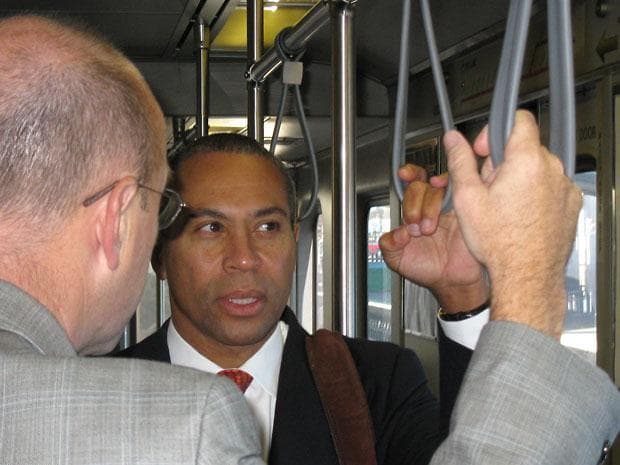Advertisement
Study Finds MBTA Passenger Safety Being Compromised

A MAJOR INDEPENDENT REVIEW OF MBTA FINANCES concludes that the T is buried under a mountain of debt that is now compromising safety and reliability because the authority cannot afford to make critical upgrades and repairs.
The 36-page report (PDF), authored by former John Hancock head David D'Alessandro, found 51 projects as a "danger to life or limb of passengers" and that $543 million in "safety-critical projects are not being funded."
The lack of funding has allowed water leaks to persist on sections of the Red Line, the report found. The leaks have displaced fasteners which has caused tracks to move out of alignment. "Train derailment" could result from the misaligned track.
Read the report (PDF)
In all, the T has a $3 billion backlog of repair projects. The report found that only 6 percent of those projects had been funded.
"The point that is clear is that reliability issues of the T — why trains might be late, why buses might break down — is because of the lack of funding more than any other issue," D'Alessandro said, speaking at a press conference at the JFK/UMass MBTA station.
Gov. Deval Patrick, also at the press conference, sought to reassure riders. "The system is safe for riders," he said, "and the good people of the T will commit to keeping it so."
PATRICK REPEATEDLY HAILED THE REPORT as a refreshing dose of transparency regarding the MBTA. "Our job and our responsibility is No. 1 to tell the truth about what is wrong," he said. "This is the first time we have that truth this clearly."
When asked by reporters for specific examples of the T's previous lack of transparency, Patrick dodged the question.
"This is not about the former GM," Patrick said, referring to ex-MBTA General Manager Daniel Grabauskas, "But I will tell you, we asked some of these questions to the former general manager and we couldn't get the answers."
Patrick commissioned the D'Alessandro report this summer following the ouster of Graubauskas.
Grabauskas' replacement, Acting MBTA General Manager William Mitchell, called the report "sobering" and said he is already acting on its findings. "At the Governor's direction, I have sent crews out this morning inspecting areas identified in the report," Mitchell said in a statement. "We will continue to monitor the safety of the system 24 hours a day."
D'Alessandro, however, refused to blame MBTA leadership, past or present, for the backlog of safety issues. Lawmakers were equally accountable, he said, for presuming the MBTA could operate on an "unrealistic" funding scheme.
"It's a failed effort," he said. "There is no opportunity for the T to be self-funding."
The MBTA currently receives its funding from a combination of state sales tax revenues, fares and real-estate sales. The "forward funding" plan was implemented by the Legislature in July 2000. The MBTA also inherited debt related, in part, to projects promised as part of the Big Dig.
The MBTA's debt has since ballooned to more than $8 billion. The T also suffers a mountain of costs that grow outside its control, including energy and health insurance.
D'Alessandro was especially critical of the T's efforts at restructuring that massive debt, writing, "MBTA debt finances are exactly opposite the position advocated by the Finance Plan."
"The T is going to have to find new permanent sources of funding," D'Alessandro said at the press conference. "The only thing that has worked is fare increases."
Patrick said he will not approve a fare increase for one or two years.
MBTA RIDER ADVOCATES CAUTIOUSLY APPLAUDED the report. "The MBTA has a long way to go to improving customer relationship and trust. Transparency is an enormous part of that," said Lee Matsueda of the T Riders Union.
"We acknowledge that there is a massive state of good repair issue that needs to be addressed," Matsueda said. "Safety is always an issue. Without new resources for public transportation, we're not doing justice to the issue of safety."
Matsueda called for the Legislature to relieve the T of part of its debt.
Transportation finance experts called the report one of the best efforts yet made to focus the public's attention on the MBTA's fiscal crisis.
"Maybe we've all been a little too wonky about our approach to this," said Paul Regan, executive director of the MBTA Advisory Board. The report will capture riders' imagination, he said.
"People are going to be looking at delays on the Red Line, problems on the Green Line and they're going to ask themselves, 'Is this safety related? Is this something that should have been repaired or fixed in advance, but the T can't do it because the T doesn't have the resources?'" Regan said. "Because, nine times out of 10, that lack of investment directly affects the experience of riders day to day."
D'Alessandro's report did not propose a financial fix for the T.
Patrick has asked Transportation Secretary Jeffery Mullan to submit funding proposals to the board of the Massachusetts Department of Transportation by January.
Regan believes solutions can be found, but implementing them will not be easy. "No approach is cheap," Regan said. "And none are free."
This program aired on November 4, 2009. The audio for this program is not available.
